|
|
|
Sort Order |
|
|
|
Items / Page
|
|
|
|
|
|
|
| Srl | Item |
| 1 |
ID:
172481
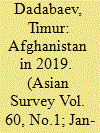

|
|
|
|
|
| Summary/Abstract |
Afghanistan in 2019 was marked by advances and setbacks with respect to stabilizing the country and reshaping its relations with international partners. The year brought new presidential elections and signs of potential political dialogue, as well as hopes for expanded economic ties with neighbors. But there are still uncertainties about the prospects of US withdrawal and the country’s future.
|
|
|
|
|
|
|
|
|
|
|
|
|
|
|
|
| 2 |
ID:
127799
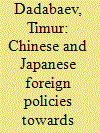

|
|
|
|
|
| Publication |
2014.
|
| Summary/Abstract |
This paper compares and analyses China's and Japan's foreign policies with regard to the newly emerging Central Asian (CA) states based on the role that each country attributes to that region, including political cooperation, economic interaction, security, public perception and mutual relevance. It demonstrates that in some respects, the interests of China and Japan in CA are similar, as exemplified by their focus on mineral resources and political stability. However, these countries differ in their approaches and strategies there: China is inclined to follow pragmatic approaches, whereas Japan's policy is a mixture of idealistic and pragmatic perspectives.
|
|
|
|
|
|
|
|
|
|
|
|
|
|
|
|
| 3 |
ID:
173954
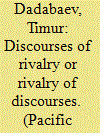

|
|
|
|
|
| Summary/Abstract |
This article analyzes discursive strategies of China and Japan to integrate newly emerging Central Asian (CA) states into their internal and external policies, norms and concepts, according to which they justify both their actions in CA and CA responses to these policies. This article elaborates the concept that to a certain extent, the interests of China and Japan in CA are similarly focused on mineral resources and political stability. However, these countries employ different discursive strategies to frame their approaches and goals. This article also emphasizes that the discourse of competition for regional domination prevalent in the English language, Russian and some CA media is largely an imposition of a zero-sum vision of international relations that is not proven by any empirical evidence. On the contrary, many of the projects conducted both by China and Japan are compatible – if not supplementary – and do not necessarily imply exclusivity of interest. At the same time, both China and Japan have different ways of reasoning their CA engagements, resulting in a rivalry of discourses for the ‘hearts and minds’ of the CA population.
|
|
|
|
|
|
|
|
|
|
|
|
|
|
|
|
| 4 |
ID:
180667
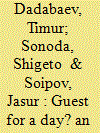

|
|
|
|
|
| Summary/Abstract |
By elaborating on the findings of two data sets collected in both Uzbekistan and Japan, this paper demonstrates that Japan has increasingly become a new frontier for Uzbek youngsters who use educational opportunities to seek temporary employment. This attitude of Uzbek students in Japan, which relates to their predisposition towards ‘work’ rather than ‘study’, can be explained by several factors. One set of explanations relates to their commitment to link their future with a home country due to the expectations of their families and communities. Another, at least partially, relates to the ambiguous and unsettled image of the role of Japan for their future, which might be contributing to their study–work imbalance.
|
|
|
|
|
|
|
|
|
|
|
|
|
|
|
|
| 5 |
ID:
188311


|
|
|
|
|
| Summary/Abstract |
Using interview data, the article demonstrates that Uzbekistani residents of Japan understand and explain their stay in Japan largely as temporary, in line with the concept of ‘sojourning’. In contrast to previous studies that operationalise sojourning according to legal status or ‘preparations to return home’, this article claims that such ‘sojourning’ needs to be treated as a constantly changing socially shaped discursive category employed by respondents to mitigate challenges such as economic hardship, discrimination and cultural assimilation. Additionally, male expatriates may describe their sojourning in culturally specific religious terms, as wanderers (musofir) in search of life experience abroad.
|
|
|
|
|
|
|
|
|
|
|
|
|
|
|
|
| 6 |
ID:
080417


|
|
|
|
|
| Publication |
2007.
|
| Summary/Abstract |
This article attempts to measure and quantify the dramatic ideological, economic and value system changes in post-Soviet Uzbekistan, using data from the Asia Barometer survey. It offers a snapshot of the situation in Uzbekistan by describing the basic changes in people's everyday lives, the way they think and act, what they aspire to and how they relate with each other. Two traceable trends in respondents' answers are a certain distrust of each other and a desire to protect themselves through close kinship or residential ties. This results in a situation where people build 'barriers' along family or community lines while preserving close relations within these units. Maintaining a balance between traditionalism, conservatism and modernization, and establishing societal trust not only within limited social networks but also between them are of crucial importance for Uzbekistan as it strives to rebuild its economy and society
|
|
|
|
|
|
|
|
|
|
|
|
|
|
|
|
| 7 |
ID:
120959
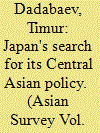

|
|
|
|
|
| Publication |
2013.
|
| Summary/Abstract |
In contrast to the claims that Japanese foreign policy increasingly shifts toward realist and pragmatic modes of engagement, this paper argues that Japanese foreign policy is largely trapped between idealist and pragmatic criteria in its Central Asian (CA) policy. Japan's policy in CA is thus a hybrid of policies that are not properly understood in CA, nor can they be explained to the public at home.
|
|
|
|
|
|
|
|
|
|
|
|
|
|
|
|
| 8 |
ID:
074039


|
|
|
| 9 |
ID:
058739


|
|
|
| 10 |
ID:
114340
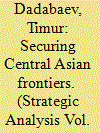

|
|
|
|
|
| Publication |
2012.
|
| Summary/Abstract |
This article develops the message that the artificially introduced administrative borders during the Soviet era, which were subject to the processes of re-delimitation after 1991, whether for reasons of security, administration, mutual distrust or the population's ethnic attachment, have become results and means of political manipulation and pressurisation. This has resulted in further pushing regional states to follow mutually exclusive policies. Although for most of these states, border delimitation is not an objective but a declared way of achieving their security, the process of delimitation detailed below casts doubts on whether border delimitation, even if successful, would actually mean increased security for the region under the prevailing conditions of unilateralism and mutual distrust.
|
|
|
|
|
|
|
|
|
|
|
|
|
|
|
|
| 11 |
ID:
127775


|
|
|
|
|
| Publication |
2014.
|
| Summary/Abstract |
This paper reviews the perceptions of the CA states (Kazakhstan, Kyrgyzstan, Tajikistan and Uzbekistan) towards the Shanghai Cooperation Organization (SCO) and conceptualises the CA states' motivations and concerns in engaging in cooperation within the SCO vis-à-vis China. The message that this paper aims to deliver is that, for the majority of the CA leadership and public, China within the SCO represents the CA states' 'other', with decolonising but increasingly dominating features. These perceptions of China in the CA region elucidate the ways in which China's involvement in Central Asia has a paradoxical and contradictory impact on the potential for the SCO to move beyond functionalism and towards the creation of a broader SCO identity. Consequently, the future of the SCO may be more limited than the West fears and Central Asia hopes.
|
|
|
|
|
|
|
|
|
|
|
|
|
|
|
|
|
|
|
|
|